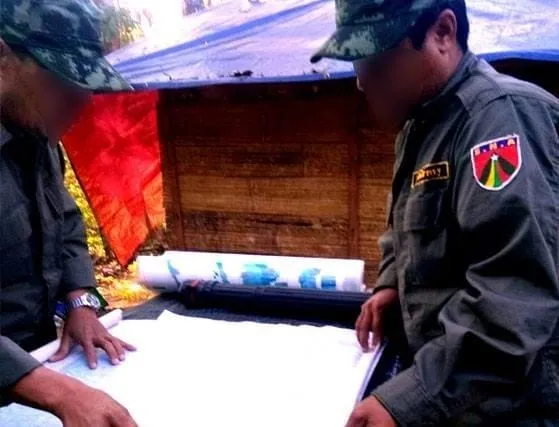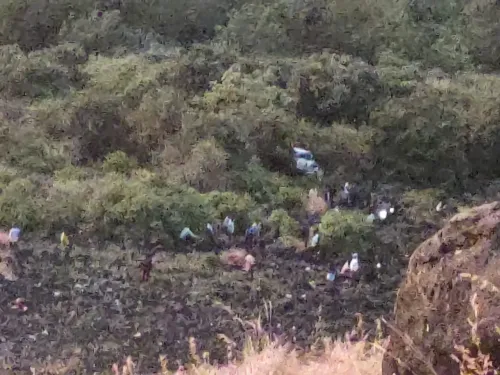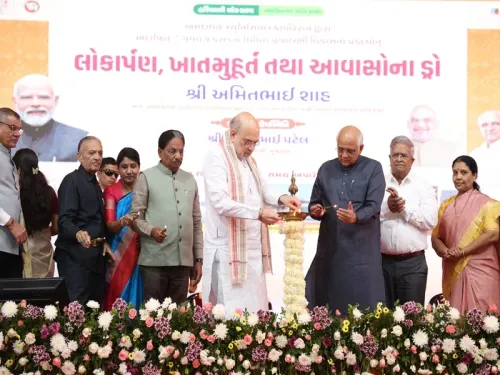Is the Rakhine Corridor Sacrificing Bangladesh's Sovereignty?

Synopsis
Key Takeaways
- The Rakhine Corridor has become a significant issue concerning Bangladesh's sovereignty.
- US military involvement is seen as a pivotal factor in future operations.
- The corridor aims to provide humanitarian aid but raises many concerns.
- Local leaders have voiced strong opposition due to security implications.
- The political landscape in Bangladesh may shift as a result of these developments.
New Delhi: The proposed ‘Rakhine Corridor’ has surfaced as a new source of controversy in Bangladesh. Reports indicate that it is already in operation, with supplies delivered in sealed containers reaching Rakhine State through covert means.
On May 8, an advance US Air Force (USAF) team reportedly landed in Dhaka, signaling the impending arrival of “a large and sensitive cargo” by air, accompanied by four USAF officers. Sources assert that the US military is set to play a pivotal role in any forthcoming military endeavors within Rakhine State, and this team’s arrival in Dhaka is related to that.
Before proceeding to Rakhine State, the US officers will engage in discussions with Bangladeshi officials. Recently appointed Bangladesh National Security Advisor (NSA) and High Representative on the Rohingya issue, Khalilur Rahman, held a closed-door meeting with Lt Gen Kamrul Hassan, Principal Staff Officer in the Armed Forces Division, prior to meeting with Army Chief Gen Waker-uz-Zaman on Thursday.
Rahman reportedly stated that the UN-supported Humanitarian Aid Corridor would aid in stabilizing Rakhine State and create favorable conditions for the repatriation of refugees.
It is noteworthy that during a visit to Bangladesh in March, UN Secretary-General Antonio Guterres suggested the establishment of a humanitarian corridor in Myanmar’s Rakhine State, with Bangladesh providing logistical support. Guterres toured Cox's Bazar on March 14, meeting with Rohingya refugees and commending the Bangladeshi populace for their hospitality. He called upon the international community to enhance support and resolve the Rohingya refugee crisis. Guterres previously visited Cox's Bazar in July 2018, stating that the UN and the global community had failed to prevent the conflict in Myanmar. A conference concerning the plight of Rohingya Muslims and other minorities in Myanmar is scheduled for September this year by the UNGA.
However, Tarique Rahman, the Acting Chairman of BNP, publicly condemned this proposal on May 1, citing security and sovereignty concerns. According to local media, while addressing the Jatiyatabadi Sramik Dal, the labor wing of BNP, Rahman remarked that the interim government's decision to permit Bangladesh to act as a Humanitarian Corridor for aid to Myanmar’s Rakhine State, currently embroiled in internal conflict, is a sensitive matter directly connected to Bangladesh's independence and sovereignty. The interim government did not inform the public and did not feel the need to consult political parties.
Divergent opinions exist within the Bangladeshi military concerning the Humanitarian Corridor.
As reported by Northeast News, one faction, primarily led by DGFI, prioritizes it for managing, controlling, and ensuring stability at the border. Meanwhile, the current Army Chief and other GoCs believe that the US intends to utilize the Bangladesh Army to support the Arakan Army (AA) and other People's Defence Forces (PDFs) in Myanmar, thereby challenging the Junta. A policy paper has been circulated by the AFD and DGFI to lessen the burden on the Border Guard Bangladesh (BGB) by designating the Bangladesh-Myanmar border as a Military Operations Zone.
In this US strategy, the Bangladesh Army’s Ramu-based 10th Infantry Division has become a crucial strategic hub. The 17th and 24th Infantry Divisions of the Bangladesh Army are also anticipated to play vital roles in Myanmar’s Rakhine State, aimed at providing Western-backed logistical and supply support to the Arakan Army.
On April 18, Khalilur Rahman conducted a meeting with senior officers of the 10th Infantry Division in Ramu. It is through this Division and the planned logistics support base in Silkhali near Teknaf that Bangladesh is playing an indirect but significant role. Senior Bangladeshi army officials from the Directorate of Military Operations are involved in strategies to expand Bangladesh's strategic influence. Plans are in motion to incorporate the armed Arakan Rohingya Salvation Army (ARSA) into this framework. A Sector Commander of Border Guard Bangladesh (BGB), in a specific area under the Army's 10 Division, would serve as the primary coordinator for supplying the Arakan Army.
The Arakan Army currently controls the Bangladesh-Myanmar border. Sources confirm that Myanmar’s military Junta presently maintains control over only three townships in Rakhine State — Sittwe, Kyaukphyu, and Manang. The remaining territories have either fallen under the control of the Arakan Army or are on the cusp of doing so. Under these circumstances, a US-backed proxy war is on the horizon, with Bangladesh becoming a strategically significant ally in supporting the Arakan Army against the Junta. Last month, NSI chief Major General Abu Mohammad Sarwar Farid, along with two other officers, had a pivotal meeting with British intelligence officers MI6/Secret Intelligence Service (SIS) to brief foreign interlocutors on this Humanitarian Corridor. DG-DGFI Major General Jahangir Alam and Brigadier General Syed Anwar Mahmud met with CIA officers during their visit to the US in April.
It is worth mentioning that Lieutenant General Joel “JB” Vowell, Deputy Commanding General for US Army Pacific (USARPAC), visited Dhaka from March 24-25, 2025. His visit marked the first by a senior US General during the Muhammad Yunus-led interim Administration since the ousting of former Prime Minister Sheikh Hasina in August 2024.
In this context, a high-level US State Department delegation arrived in Dhaka on April 16, 2025. Accompanied by 12-13 additional staff members, they discreetly visited the Chittagong Hill Tracts (CHT) and Cox's Bazar to evaluate ground realities and assess geographic and logistical conditions in preparation for future operations. However, it could not be confirmed whether they visited Silkhali (approximately 30 km north of Teknaf), where the Bangladesh Army is establishing a significant logistics support base. This site is expected to function as the primary conduit for delivering non-lethal supplies and other resources to the Arakan Army and Chin National Front (CNF).
According to Pressenza, the USARPAC is supposed to offer logistics and security for Internally Displaced Persons (IDPs) in Rakhine State, which is facing severe famine, as stated in the UNDP report of November 2024. The report indicated that Rakhine is on the brink of an unprecedented disaster due to a combination of interlinked issues; its economy is failing, and essential services and social safety nets are nearly non-existent. With trade at a near standstill, over two million individuals are at risk of starvation.
Beneath the pretext of a Humanitarian Corridor, a broader political initiative of the ‘Arakan Federation’ is taking shape, which is likely to affect Bangladesh's southeastern regions of Teknaf and Bandarban in the Chittagong division. While this collaboration could shift the regional security balance, it may also provoke new tensions in Bangladesh-India and Bangladesh-Myanmar diplomatic relations. Referring to the “so-called Humanitarian Corridor,” China’s Ambassador to Bangladesh Yao Wen stated in Dhaka on May 8 that Beijing is not involved in this initiative and respects the sovereignty and territorial integrity of every nation.
When considering Bangladesh's aspirations through this Humanitarian Corridor, the answer seems straightforward: it would facilitate Western aid, military supplies, and financial resources, alongside establishing a surveillance base within its own territory, in addition to intelligence gathering by Western nations.
The global community has observed the complete failure of Humanitarian Corridors in cases such as Afghanistan, Syria, Iraq, Libya, Gaza, the West Bank, East Jerusalem, and Ukraine. There are no specific laws governing Humanitarian Corridors or Safe Zones. Voluntary agreements often result in disregard by combatants, thereby endangering civilians and humanitarian workers.
The essential inquiry is whether Yunus is the primary participant in the complex strategic plans of the West in Bangladesh and South Asia. The US is also keen on establishing a base in the region. Observing the nine months of the interim government’s administration, true intentions are becoming apparent. Yunus appears to be becoming a puppet of the West, with a concealed agenda that could strain Bangladesh’s international reputation and undermine the nation’s secular fabric. The Bangladesh Army is under pressure from the US military and intelligence to finalize this Humanitarian Corridor, and many doubt its complete functionality, as establishing these corridors is typically a challenging endeavor. Should Bangladesh construct the corridor with covert US involvement, it would constitute direct interference in Myanmar’s internal affairs and escalate armed conflict.
(The writer is an expert on South Asia and Eurasia. He was previously associated with the Manohar Parrikar Institute for Defence Studies and Analyses. The opinions expressed are personal.)










